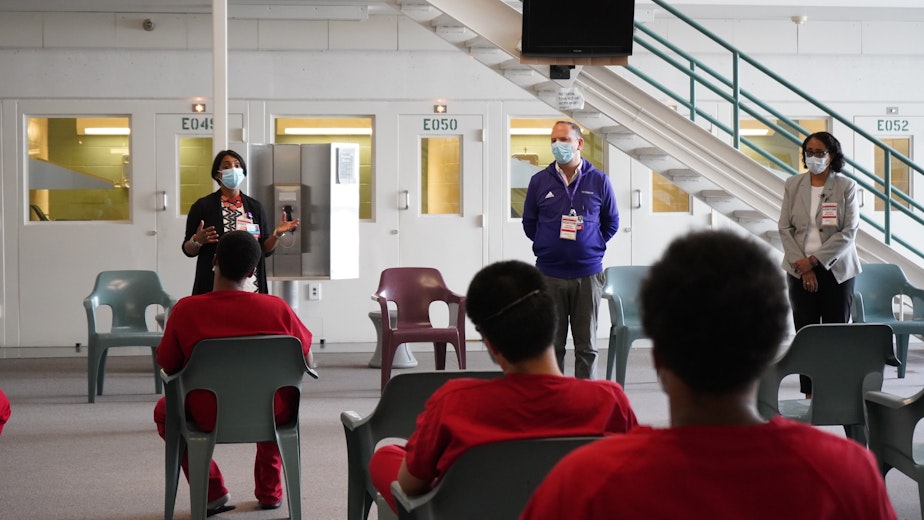UW physicians try jailhouse calls to demystify Covid vaccine

King County jails currently have just one confirmed Covid-positive inmate, down from dozens of cases in an outbreak last March. But more than fifty percent of the people in custody have consistently declined to get the Covid vaccine. It’s a statistic jail health staff are trying to change.
One tactic is bringing in outside experts to answer questions and build trust. It’s part of a larger public health shift from mass vaccinations to more targeted outreach. Last week medical experts from the University of Washington visited local detention centers in King County, in hopes of addressing the vaccine refusal rate among more than 1,200 adult inmates, which is currently 54.6%.
Danotra McBride is the director of King County’s Jail Health Services, a division of the county's public health department. She said one challenge in promoting vaccines is the inherent distrust inmates feel toward jail staff, even though Jail Health is separate from the Department of Juvenile and Adult Detention that runs the facilities.
“I want to call it out as a unique challenge, that I’m sure every jail and prison faces,” McBride said.
McBride said that’s one reason that vaccination rates nationwide are lower for incarcerated people. So members of the University of Washington’s Office of Healthcare Equity recently offered to send physicians to speak with small groups of inmates, in hopes of being more persuasive.
Outside the Regional Justice Center in Kent last week, three medical colleagues from the University of Washington emerged after a visit with 10 inmates. Dr. Santiago Neme, the medical director of the UW Medical Center - Northwest, said he wanted to help address the disproportionately higher rates of vaccine refusal Jail Health has documented among Black and Latino people in custody.
Sponsored
“I’m a Latino man, I know my community is really at higher risk for getting Covid, even from asymptomatic to mild to high hospitalization rates,” Neme said. “So we really want to make a dent on these preventable infections.”
Neme and Dr. Bessie Young, the medical director for the UW Office of Healthcare Equity, said simply demystifying the process of getting the vaccine often makes a difference.
“We did have a staff member who actually shared when she got her vaccine and how she felt and why she got it – she got it to protect herself and her parents," Young said.
Inmates can request the vaccine at any time.
“The facilities are offering vaccines so that’s really important for this population,” Young said. “So that they can get vaccinated here and then as they get released they can go out to their families and really spread that message.”
Sponsored
The physicians also emphasized that inmates currently have a choice between the one-shot Johnson & Johnson vaccine or the two-shot Moderna.
Dr. Shireesha Dhanireddy, the clinical lead for UW Medicine Covid vaccination program, was the third member of the outreach effort. She said inmates asked important questions, like whether they need the vaccine if they’ve already had Covid. Dhanireddy told them they still need the vaccine because there’s no certainty on how long immunity from having Covid lasts.
Dhanireddy said she may never learn whether the inmates they spoke to in Kent went ahead and got the vaccine. But she said at least they were talking about it.
“There was ongoing dialogue as we left the room – people talking to each other about what they thought,” she said. “I think that’s really encouraging that they were having a dialogue amongst themselves.”
The previous day the same physicians had visited the SCORE regional jail in Des Moines, where Dhanireddy said four inmates signed up to be vaccinated immediately following their discussion.
Sponsored
“So I felt like that was a huge win,” she said.
But they noted that so far their visits have only been among male jail populations, they haven’t had the opportunity to address any incarcerated women.
Dhanireddy said while overall Covid rates are falling, that obscures the fact that new cases are concentrated in unvaccinated people.
“Our case rates in our unvaccinated individuals are as high as they were during our January surge this year,” she said.
McBride with Jail Health says beyond these doctors’ visits, they’re trying to increase vaccination rates by offering it at booking, and more than once after that.
Sponsored
“So even if someone refuses the vaccine, we would go back to them later on, give them time to process and think about it,” she said.
They’re also encouraging jail staff to get vaccinated – one inducement will likely be the ability to opt out of the routine Covid testing they’ve been doing since the last outbreak.
“So there are things like that we can use as an incentive,” McBride said, noting that jails are trying to promote the vaccine from multiple angles.
“We also started playing a video in booking, in particular trying to reach our African-American patients and patients of color, to have people who look like them talking the video," McBride said.




